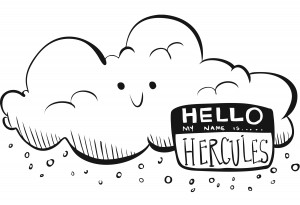A Storm Called Hercules

According to psychologist Nicholas Epley and his colleagues writing in Psychological Review in 2007, people are more likely to ascribe human characteristics to nonhuman agents when they don’t understand them well, or when they highly value maintaining control and avoiding uncertainty.
By naming things, and people, we try to shape them. When parents name their babies, they often attempt to influence their children’s futures, rather than merely identify them, according to a 2011 Cultural Sociology article by sociologists Mark Elchardus and Jessy Siongers. But they are wrong: one’s class background plays a more important role in shaping their lives. Similarly, while naming a storm might be a way of asserting power over it, we can’t actually control the storm through this naming. We can indicate that we understand the storm—but this is largely a symbolic gesture. Professional meteorologists might genuinely possess this understanding, but the rest of us can only dream of being like Hercules.
